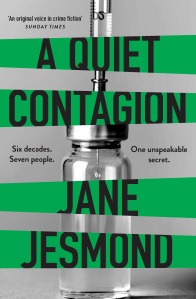My Friday Reads this week is a disquieting contemporary mystery with a historical twist and fast-paced plot A Quiet Contagion by Jane Jesmond. Let’s find out a bit about the book then get talking to Jane.
Blurb
Six decades. Seven people. One unspeakable secret.
1957. A catastrophe occurs at the pharmaceutical lab in Coventry where sixteen-year-old Wilf is working for the summer. A catastrophe that needs to be covered up at all costs.
2017. Phiney is shocked by the death of her grandfather, Wilf, who has jumped from a railway bridge at a Coventry station. Journalist Mat Torrington is the only witness.
Left in utter disbelief, with a swarm of unanswered questions, Phiney, Mat and Wilf’s wife, Dora, begin their own enquiries into Wilf’s death. It is soon clear that these two events, sixty years apart, are connected – and that Wilf is not the only casualty.
But what is the link? And can they find out before any more lives are lost?
Pre-order link – https://geni.us/quietcontagion
Opening
Wilf fixed his eyes on the reassuring straightness of the railway tracks, gleaming and solid in the morning sun. To his left they ran back to Coventry, where he’d come from earlier, and to his right towards Birmingham and then the north. For a moment he was gripped by the idea of taking a train north and disappearing.
Two nights without sleep had torn away the fences between his memories and let them mingle. One moment the events of sixty years ago crashed around his head and the next minute the angry scenes at yesterday’s reunion clawed them into shreds. The young faces he remembered from 1957 shrivelled into their grim older versions – all talking at once. Michael Poulter, speaking through the thick tiredness of illness. Jean Storer, calm and eloquent, only her hands, clenching and unclenching, revealing how desperate she was.
He shook his head and Jack, his assistance dog, scrambled to his feet from under the bench and stared at him with his odd-coloured eyes, thinking they were finally on the move. Wilf bent and patted him.
‘Not yet, Jack,’ he said. The movement made him wince. The brace that supported his left leg, shrivelled and useless from childhood polio, had rubbed a raw patch on the side of his knee. He’d been on his feet too much over the last two days and, anyway, he wasn’t as adept as Dora at fitting it.
Dora. Her face joined the others raging round his head. And Phiney. Dora, his wife. Phiney, his granddaughter. How could he tell them about the terrible thing he’d been part of all those years ago? He sighed. Jack watched him, waiting for his next move.
The young man beside him on the bench looked up from his iPad.
‘Nice dog,’ he said.
Wilf ignored him. Exhaustion was draining his senses. Darkness blurred the outskirts of his vision and his fingers no longer felt the wood of the bench. He was drowning in a sea of memories. Unable to move. Unable to breathe. Unable to fight.
He’d felt like this before. After Carol, his daughter, died. The doctor had given him pills. They helped. A little. Made it possible to get through the day.
What helped most was Dora. The doctor said he should talk, so she made him. Every day, she made him talk. About anything and everything. It didn’t matter, she said, he could talk about his bloody clocks. She didn’t mind but talk he would.
And he had. He talked about the clocks he loved and then about all the dogs who’d loved him. About the good bits of his childhood. And then about the bad. About the polio that had been his constant companion. About the pain. About the loneliness. About the way his legs looked and all the bad feelings that he wasn’t supposed to have. He talked for weeks and weeks, and she listened and said nothing much although occasionally she glowered or scrubbed her eyes.
And when the time came to speak about Carol, he was unhappy and angry and grieving and missing her but the awful suffocation of the depression had passed, dissolved by all the words he’d shared with Dora.
Until now.
This time, though, he’d be alone because no one could forgive the thing he’d done. Not Phiney. Not even Dora.
But worse than the thought of Dora and Phiney, were the accusing voices in his head, beating against his skull. He staggered to his feet, knowing he had to get rid of them. Except they were in him and part of him. He’d never silence them. He’d have to carry them with him for the rest of his life. For the rest of his life.
He couldn’t. He knew he couldn’t.
Goodness, that sounds a gripping read, Jane, Can you tell us how you came to write this book?
When I started planning my latest book A Quiet Contagion – out in November – I knew I wanted to write about a long buried secret and how keeping it hidden had changed the lives of the people who knew about it. However if the secret was going to be long buried, some part of my book would have to be set in the past and while I love reading historical fiction, I was terrified by the thought of writing it.
There’s so much to get wrong: using an anachronistic piece of vocabulary; making a mistake with some detail of dress or transport or housing; striking the right balance between too much or too little historical detail. Plus, I like to immerse myself in a scene when I’m writing. To see, hear, feel and think like the character whose head I’m in and couldn’t imagine being able to do that inside someone living in Victorian or Georgian times. I knew this was pathetic. Historical fiction writers do it all the time. Nevertheless I was blocked.
Then one day, while visiting my sister in Coventry, I went into the Herbert Art Gallery and Museum and wandered through their permanent exhibition of Coventry’s social history. And after rediscovering that George Eliot had lived locally and learning how Coventry was flattened during World War II, I suddenly found myself surrounded by objects and pictures that took me straight back to my childhood and adolescence.
Here was the old pressure cooker and mangle I remembered my mother using, and the Teasmade she had by her bed (A sort of alarm clock that also produced a cup of tea if you’ve never come across one). A black telephone with a heavy handset and dial and a record player you could stack six records on so it could play them one after the other – the height of technical wizardry in those days. Those days before cassettes, CDs and streaming, before remote controls and thousands of different TV channels, before mobile phones and…. The list of inventions I’ve seen arrive since I was born in the fifties is endless.
I found it quite funny that these objects I knew so well should be in a museum. And a bit strange. Parts of my life had become history. When had that happened? But it also gave me an idea. I realised I could write historical fiction. I might be uncomfortable imagining myself back in Elizabethan times but I only had to shut my eyes and remember my own past to write about the fifties, the sixties and the decades after that. They were as clear to me as today.
So the idea of writing about a secret embedded in the world of the 1950s with repercussions over the decades to the present day seized my mind and stayed put. The next stage was to discover what the secret was…
I’m the same generation, Jane, and I agree it seems strange that our childhood has become history, the things we played with and used museum artefacts!
Meet Jane
Jane Jesmond writes psychological suspense, thrillers and mysteries
Her debut novel, On The Edge, the first in a series featuring dynamic, daredevil protagonist Jen Shaw was a Sunday Times Crime Fiction best book. The second in the series, Cut Adrift, was The Times Thriller Book of the MonthandThe Sunday Times Crime Book of the Month. She has also written two standalone thrillers – Her, a psychological thriller with a speculative twist (May 2023) and A Quiet Contagion, a mystery thriller inspired by the 1957 Coventry Polio Epidemic (November 2023).
Although she loves writing (and reading) thrillers and mysteries, her real life is very quiet and unexciting. Dead bodies and danger are not a feature! She lives by the sea in the northwest tip of France with a husband and a cat and enjoys coastal walks and village life.
Stay connected to Jane and receive news about her books and giveaways by signing up for her newsletter – https://jane-jesmond.com/contact/
You can find Jane:
On Twitter – @AuthorJJesmond
On Facebook – http://www.facebook.com/JaneJesmondAuthor
On Instagram – http://www.Instagram.com/authorjanejesmond
Thanks so much for dropping by to talk to us today, Jane.

Amazon Author Page: https://www.amazon.co.uk/Karen-King/e/B0034P6W7I
Website: https://karenkingauthor.com/

